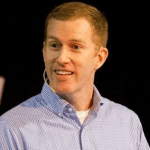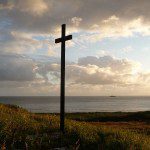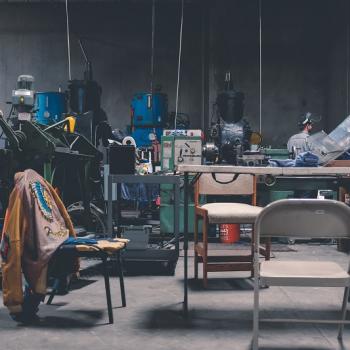By David Spickard
As I normally do on work trips, I packed my running clothes and shoes just in case I had the opportunity to get in a quick run. I love running when I’m out of town as it allows me to explore the cities I’m in while keeping up my exercise. Thankfully, the temperature wasn’t too cold when I woke up in Florissant, the community right next to Ferguson, MO. There would be plenty of time for me to go before my first meeting.
 Since I was unfamiliar with the area, I checked my Google Maps to find a good route before heading out. It was early Saturday morning, and the sun was just coming up. I headed down a pretty busy street, then tailed off into some neighborhoods.
Since I was unfamiliar with the area, I checked my Google Maps to find a good route before heading out. It was early Saturday morning, and the sun was just coming up. I headed down a pretty busy street, then tailed off into some neighborhoods.
With no cars on the road, I chose to run down the middle of the streets instead of the sidewalks. It was easier and allowed me to go a bit quicker (which is not saying much).
Not once did I think this was a bad idea.
The day before, I along with Pastor Ken Jenkins took some time to ride down Canfield Drive in Ferguson, the street where Michael Brown died. I was hesitant to be one of the many people who have driven down Canfield over the past year as an onlooker to the events that took place there. But I couldn’t pass up the chance to see what the environment really was like. So much of my perceptions are influenced by what I see in the news that I wanted to see it firsthand.
 I was struck to discover Canfield is a “No Outlet” street – a side road off a busy main road with very little through traffic. It’s lined with houses on either side then apartments. The street dead ends into an apartment complex with a small street on the left taking drivers to the other side of the neighborhood and a roundabout enabling cars to head back out to the main road.
I was struck to discover Canfield is a “No Outlet” street – a side road off a busy main road with very little through traffic. It’s lined with houses on either side then apartments. The street dead ends into an apartment complex with a small street on the left taking drivers to the other side of the neighborhood and a roundabout enabling cars to head back out to the main road.
Having lived for years on a small side street with no outlet, I can’t count how many times I’ve walked down the middle of the street to get to my house. It would be as normal as walking on the sidewalk.
For Michael Brown, walking down the middle of the street was one of the key factors that led to his death.
Halfway during my run, I realized the painful irony. If I were African American or any other person of color, I would not have had the freedom to run in these neighborhoods, much less down the middle of the streets. If someone had seen an unknown black man wearing my black pullover running down the street early in the morning, there’s a good chance the Florissant police would have been notified.
Instead, I ran with no care in the world. The epitome of White Privilege.
For those of us who are white, white privilege is not a message of guilt, it’s a call for awareness. It’s not an attempt to shame, it’s a cry for understanding. It’s not an opinion, it’s a fact.
In “This is What White Privilege Is,” Christine Emba from The Washington Post writes,
“A request to acknowledge one’s privilege is just a reminder to be aware — aware that you might not be able to fully understand someone else’s experiences, that the assumptions you were brought up with may be blinding you, that some people may have to struggle for reasons foreign to you.
Pointing out that white privilege exists isn’t the same as accusing every white person of being a racist. And acknowledging that you might benefit from such privilege doesn’t mean that you’re apologizing for being white…”
Our defensiveness often misses the larger point that we live in a world skewed in our favor. We benefit from being white. And people of color face uphill battles we simply do not face.
Should we feel guilty for that? No.
Should we do something about it? Absolutely.
This first step is knowing it exists and recognizing when it happens. Nothing can be done until we realize how uneven the playing field truly is.
Second, we must enter into the lives of those who experience a world stacked against them. We can never walk in their shoes, but we should walk close enough to at least get a taste.
And third, we need to take a step. There is no prescription or formula. If there were, we’d run the risk of being the savior, which is what we white people often tend to do.
For me, one of my steps is writing this blog. Another is being intentional to hire people of color in positions of power in our organization. Another is regularly putting myself in situations where I am the minority.
I will never arrive with this. It’s a forever, ongoing journey for me. I know my run is one of many examples of privilege I experience on a daily basis. Some I recognize. Some I completely miss.
Regardless, it’s a journey I’m willing to take.
How about you?
Reprinted from Jobs for Life.
 David Spickard is the President and Chief Executive Officer of Jobs for Life (JfL), a global non-profit organization that engages and equips the local church to address the impact of joblessness through the dignity of work. He lives in Raleigh, NC with his wife, Alice, and their four children.
David Spickard is the President and Chief Executive Officer of Jobs for Life (JfL), a global non-profit organization that engages and equips the local church to address the impact of joblessness through the dignity of work. He lives in Raleigh, NC with his wife, Alice, and their four children.













